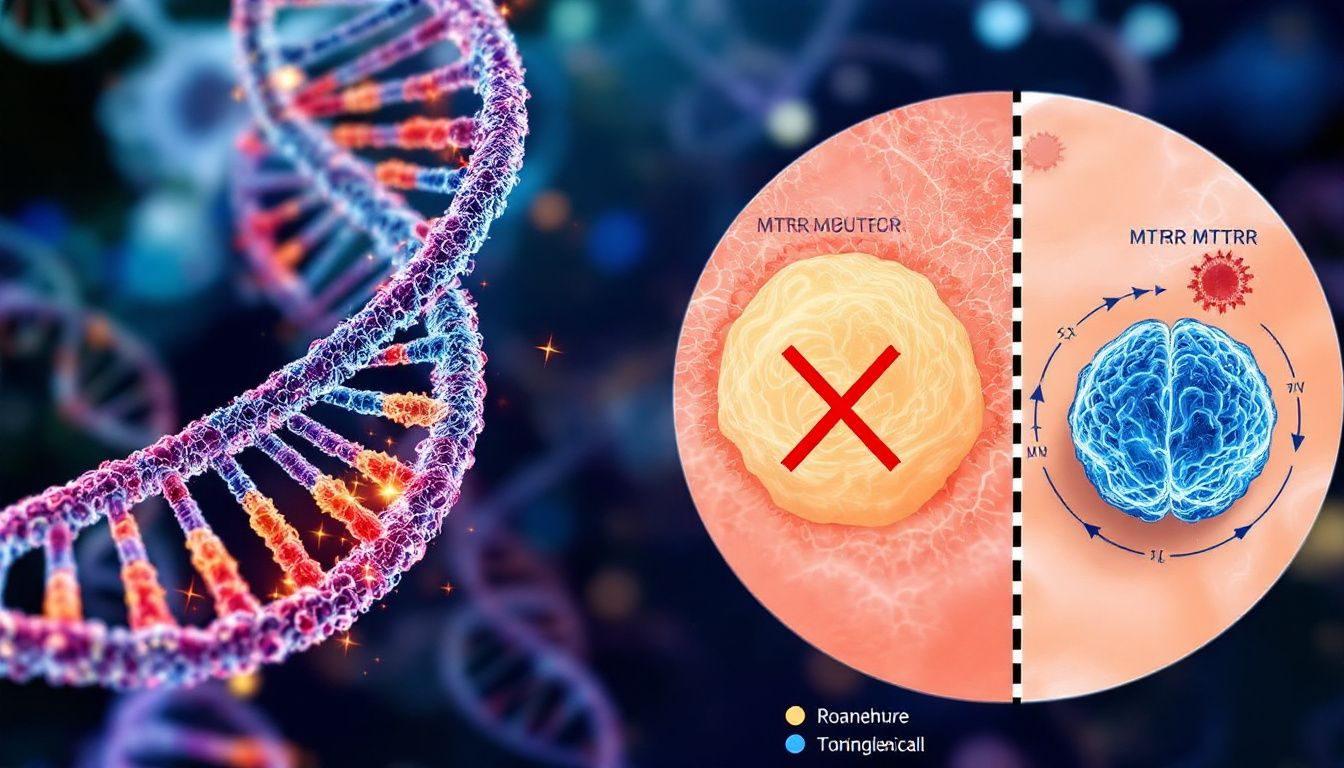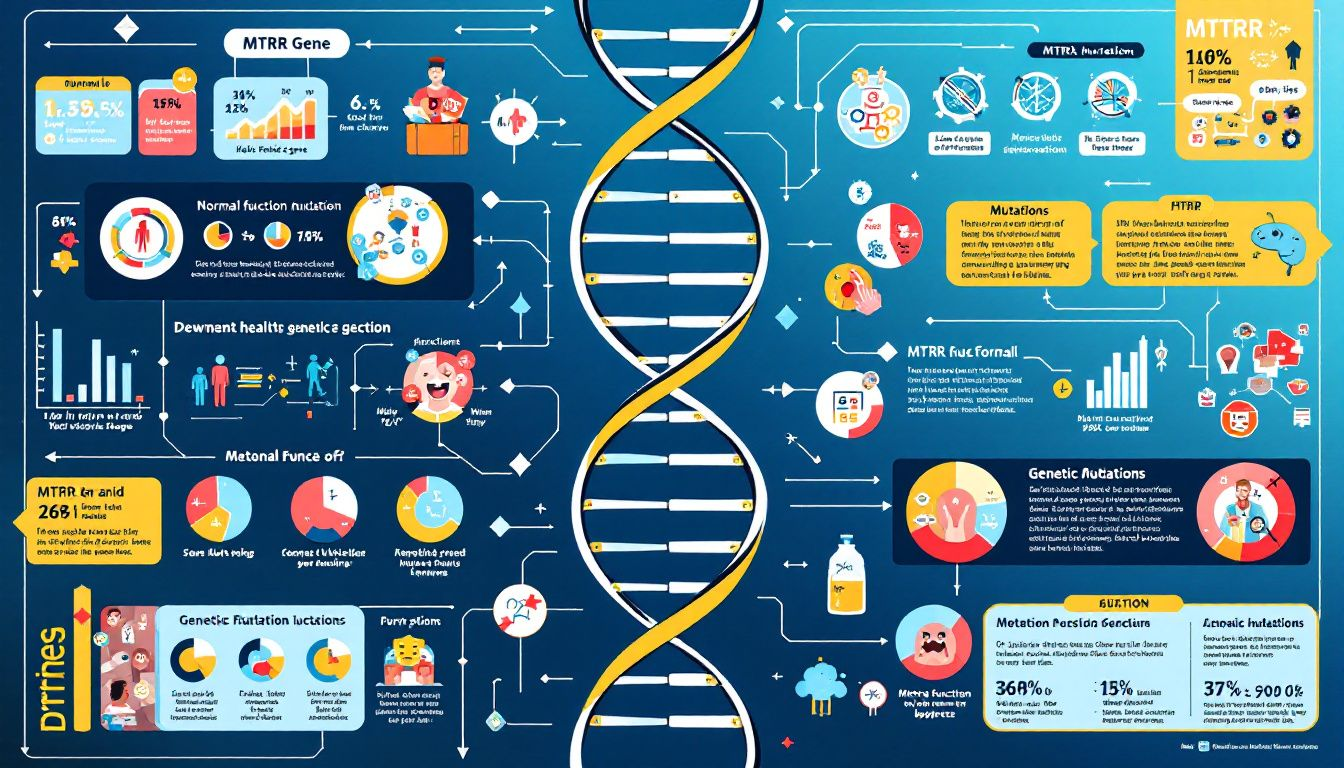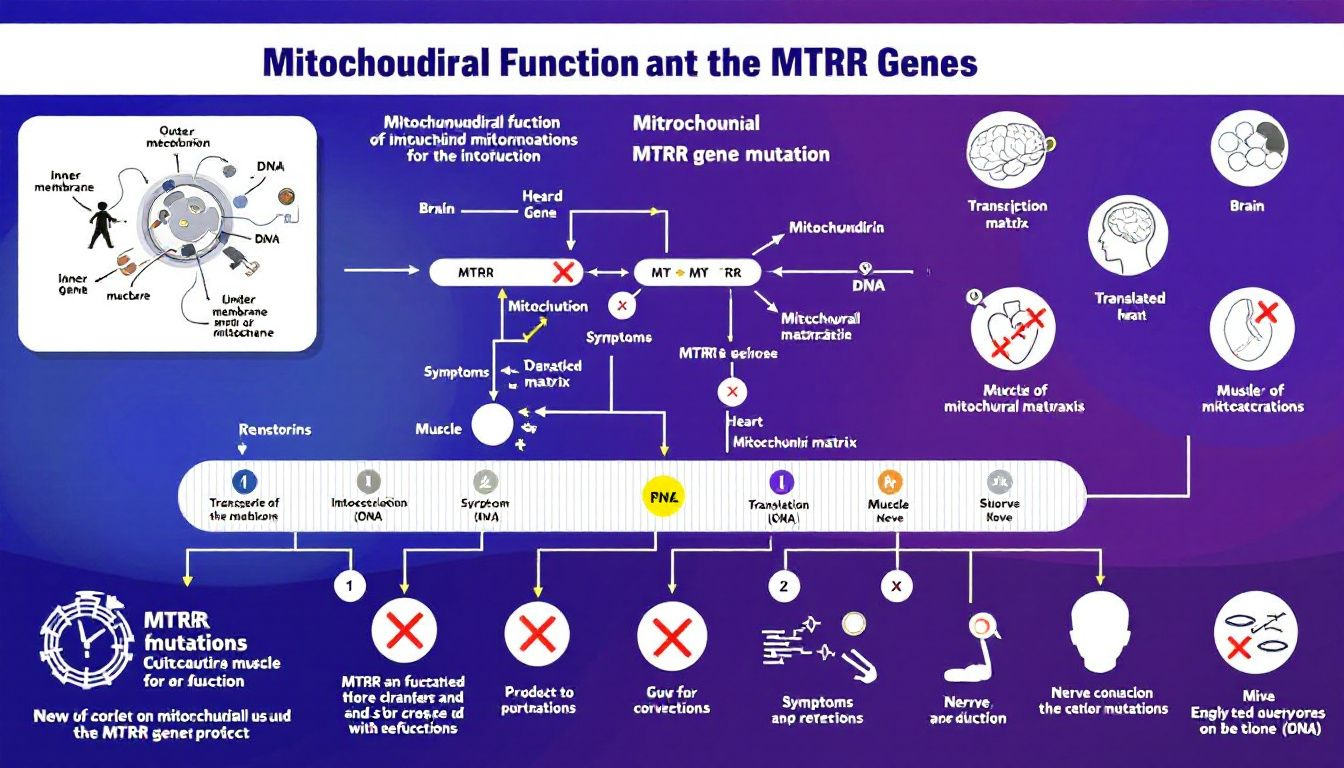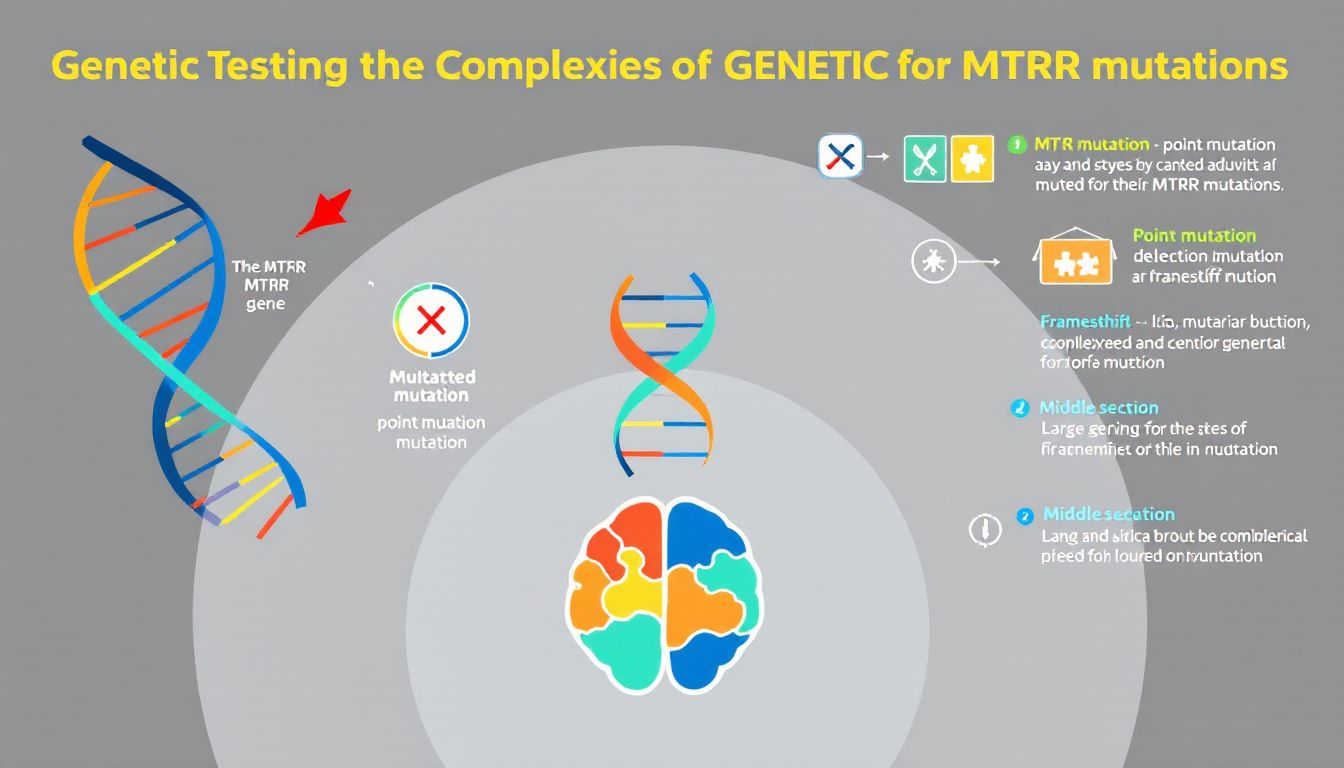Curious about MTRR mutation symptoms? This article breaks down the key symptoms, from cognitive issues to cardiovascular problems caused by these genetic changes.
Key Takeaways
The MTRR gene is essential for homocysteine metabolism, influencing DNA methylation and protein synthesis, and requires Vitamin B12 for proper function.
Mutations in the MTRR gene can result in serious health issues, including cognitive decline, cardiovascular diseases, and neural tube defects, necessitating early detection and intervention.
Management strategies for individuals with MTRR mutations include vitamin supplementation and dietary adjustments to regulate homocysteine levels and improve overall health outcomes.
Understanding MTRR Gene and Its Functions

The MTRR gene encodes the enzyme methionine synthase reductase, which is indispensable for regenerating functional methionine synthase. This enzyme plays a crucial role in converting homocysteine, a sulfur-based amino acid, to methionine, a process vital for maintaining homocysteine metabolism. Human methionine synthase reductase is critical for this function. Methionine, in turn, is a critical component for DNA methylation and protein synthesis, underscoring its importance in various biological functions.
Vitamin B12 is another key player in this intricate process. It is essential for the proper function of the MTRR gene, influencing the regeneration of methionine synthase and thereby affecting homocysteine levels. Without adequate Vitamin B12, the functionality of methionine synthase can be severely compromised, leading to elevated homocysteine levels and subsequent health issues.
Understanding the MTRR gene’s functions offers invaluable insights into its broader impact on our health. The MTRR gene, along with MTR, helps maintain metabolic balance and proper bodily functions. This foundational knowledge sets the stage for exploring the symptoms and complications arising from mtrr genes mutations.
MTRR Gene and Methylation
Role of Methionine Synthase Reductase in Methylation
Methionine synthase reductase (MTRR) plays a pivotal role in the methylation process, a fundamental biochemical reaction essential for numerous bodily functions. This enzyme is responsible for regenerating methionine synthase, which converts homocysteine into methionine. Methionine is then utilized to produce S-adenosylmethionine (SAMe), a universal methyl donor involved in a myriad of methylation reactions. These reactions are crucial for the synthesis of DNA, proteins, and other vital biomolecules. Without the proper function of methionine synthase reductase, the entire methylation cycle can be disrupted, leading to elevated homocysteine levels and subsequent health issues.
Importance of Methylation in Bodily Functions
Methylation is a critical process that influences various bodily functions, including gene expression, protein synthesis, and cellular metabolism. It plays a key role in regulating gene expression, ensuring that genes are activated or silenced at appropriate times. This regulation is vital for normal development and cellular function. Additionally, methylation is necessary for the synthesis of proteins, which are essential for maintaining cellular structure and function. Impaired methylation can lead to a range of health conditions, including genetic disorders, cancer, and neurological diseases. Understanding the importance of methylation underscores the significance of the MTRR gene in maintaining overall health.
Common Symptoms of MTRR Mutations

Mutations in the MTRR gene can lead to a cascade of health issues, primarily due to the disruption of homocysteine metabolism. These genetic mutations can manifest in various ways, from cognitive decline to cardiovascular diseases. The symptoms associated with MTRR mutations are diverse and often severe, making early recognition and diagnosis crucial.
We will explore the specific symptoms and their implications.
Cognitive and Developmental Issues
Cognitive challenges are among the most significant issues faced by individuals with MTRR mutations. Genes involved in vitamin B metabolism, including the MTRR gene, are connected to cognitive issues and schizophrenia. Genetic variations in the MTRR gene are linked to learning disabilities, difficulties in social relationships, and intellectual disabilities. These cognitive struggles can significantly impact an individual’s quality of life, affecting their ability to function independently in society.
Disruptions in one-carbon metabolism from MTRR mutations elevate plasma homocysteine levels, correlating with developmental delays and cognitive decline. This underscores the MTRR gene’s critical role in brain development and function, stressing the necessity for early intervention and support.
Clinical and molecular studies have shown that individuals with these mutations often present with various learning challenges, further underscoring the gene’s impact on cognitive health. A comprehensive approach, including educational support and targeted therapies, is needed to address these cognitive and developmental issues.
Cardiovascular Complications
The cardiovascular system is another area profoundly affected by MTRR mutations. Elevated homocysteine levels, a direct consequence of these mutations, are an independent risk factor for cardiovascular disease. This increased risk is due to impaired methylation, which upregulates atherosclerotic susceptible genes and downregulates protective ones. The metabolism of amino acids, specifically the interconversion of homocysteine and methionine, plays a crucial role in this process.
Individuals with MTRR mutations are at a heightened risk for conditions such as premature coronary artery disease and cerebral, coronary, and peripheral atherosclerotic pathology. These genetic and biochemical factors collectively increase risk factors for cardiovascular conditions, necessitating regular evaluations for those affected.
Neural Tube Defects and Birth Defects
MTRR mutations can also lead to severe birth defects, including neural tube defects. Folate deficiency, often linked to these mutations, significantly raises the likelihood of neural tube defects during fetal development. This connection highlights the importance of adequate folate intake, particularly during pregnancy.
The 66A>G polymorphism in the MTRR gene is particularly associated with an increased risk of spina bifida, doubling the risk for affected individuals. This highlights the need for prenatal diagnosis and genetic counseling for families with a history of MTRR mutations, ensuring timely interventions and better health outcomes.
Health Conditions Associated with MTRR Mutations
Coronary Artery Disease
Mutations in the MTRR gene have been linked to an increased risk of coronary artery disease (CAD), a condition characterized by the narrowing or blockage of the coronary arteries that supply blood to the heart. Elevated homocysteine levels, a byproduct of disrupted methionine metabolism, are a known risk factor for CAD. When methionine synthase activity is impaired due to MTRR mutations, homocysteine accumulates, increasing the risk of developing CAD. This connection highlights the importance of monitoring and managing homocysteine levels in individuals with MTRR mutations to mitigate cardiovascular risks.
Metabolic, Folate Metabolism, and Liver-Related Symptoms

MTRR mutations can lead to significant disruptions in one-carbon metabolism, affecting both liver morphology and metabolism. These disruptions can manifest as metabolic syndrome, fatty liver disease, and glycogen storage issues.
The following subsections will delve deeper into these specific metabolic and liver-related symptoms.
Fatty Liver Disease
One of the notable complications of MTRR mutations is fatty liver disease. The methionine synthase reductase gene plays a crucial role in regulating liver metabolism, and its mutations are associated with disruptions in one-carbon metabolism and conditions like nonalcoholic fatty liver disease. Altered lipid metabolism, a consequence of these mutations, contributes to conditions like nonalcoholic fatty liver disease. Research on Mtrr gt/gt mice has shown enlarged livers with eosinophilic hepatocytes and reduced glycogen content, indicating significant disruptions in liver metabolism.
Interestingly, despite these metabolic changes, mitochondrial function in these mice remained unaffected. This suggests that the primary issues lie in lipid and glycogen metabolism rather than mitochondrial dysfunction. These findings emphasize the need for targeted therapies to address liver-specific metabolic issues in individuals with MTRR mutations.
Glycogen Storage Issues
Glycogen storage issues are another metabolic complication arising from MTRR mutations. Disruptions in one-carbon metabolism due to these mutations can impair the production of phosphatidylcholine, crucial for lipid metabolism. This impairment can lead to conditions like nonalcoholic fatty liver disease and glycogen storage disorders.
Reduced beta-oxidation of fatty acids in individuals with MTRR mutations further exacerbates these metabolic imbalances. Glycogen storage issues can lead to hypoglycemia, affecting metabolic balance and requiring careful dietary management and monitoring.
Molecular and Biochemical Impacts

The molecular and biochemical impacts of MTRR mutations are profound, affecting a wide range of metabolic processes. These mutations disrupt enzyme activities and mitochondrial function, leading to significant metabolic imbalances.
Genetic variations within the methionine synthase reductase combined pathways also play a crucial role in influencing metabolic processes and potential risk factors for neurodevelopmental issues.
The following subsections will explore these impacts in detail.
Enzyme Activity Alterations
Significant reductions in methionine synthase activity, a methionine synthase enzyme called methionine synthase crucial for folate metabolism, can result from MTRR mutations. Premature termination codons in the MTRR gene can create truncated, non-functional proteins, impairing enzyme functions, leading to methionine synthase reductase deficiency.
Disruptions in enzyme activity can elevate homocysteine levels, affecting various metabolic processes like lipid and glycogen metabolism. In Mtrrgt/gt mice, important genes related to glycogen synthesis show decreased expression, indicating impaired glycogen metabolism.
Mitochondrial Function
The MTRR gene plays a crucial role in maintaining mitochondrial integrity by regulating one-carbon metabolism. In studies of Mtrrgt/gt mice, mitochondrial electron transfer system activity remained unaffected despite changes in hepatic lipid and glycogen metabolism. This suggests that while mitochondrial function remains intact, the metabolic disruptions primarily affect lipid and glycogen metabolism.
Altered mitochondrial function from MTRR mutations can disrupt energy metabolism, affecting liver morphology and metabolic profiles. The presence of eosinophilic hepatocytes in mice with MTRR mutations may indicate mitochondrial dysfunction, potentially related to cellular stress responses.
Diagnosis and Genetic Testing

Diagnosing MTRR mutations involves genetic testing, focusing on identifying specific single nucleotide polymorphisms (SNPs) in the MTRR gene. Testing for these SNPs can help identify individuals at risk for elevated homocysteine levels, a significant indicator of related health risks.
The MTRR A66G mutation, in particular, has shown nominal associations with serum homocysteine levels in various studies. Genetic testing for this mutation, along with other relevant SNPs, plays a critical role in early diagnosis and management of health risks associated with MTRR mutations.
Treatment and Management Strategies
Managing the symptoms of MTRR mutations involves a combination of vitamin supplementation and dietary adjustments. These strategies aim to alleviate symptoms and improve overall health outcomes for affected individuals.
The following subsections will explore these management strategies in detail.
Vitamin B12 Supplementation
Vitamin B12 and folic acid supplementation are crucial for managing health conditions associated with MTRR mutations. High doses of vitamin B12, particularly hydroxocobalamin, have shown promise in alleviating neurological symptoms associated with these mutations. Incorporating foods rich in vitamin B12, such as meat, dairy, and certain fortified cereals, is essential for individuals managing MTRR mutation effects.
Folic acid supplementation can also play a vital role in alleviating symptoms. Incorporating foods rich in choline and folate is suggested to improve methylation processes affected by MTRR mutations. Dietary modifications that emphasize foods rich in vitamin B12 can support better management of homocysteine levels in individuals affected by MTRR mutations.
Dietary Adjustments
Dietary adjustments can play a crucial role in managing the effects of MTRR mutations. Incorporating sufficient sources of methionine in the diet can help counteract problems arising from MTRR mutation-related metabolic issues. Increased intake of methionine may assist in reducing elevated homocysteine levels characteristic of these mutations.
These dietary changes, combined with vitamin supplementation, can significantly improve the health outcomes for individuals with MTRR mutations, helping them manage symptoms more effectively.
Research and Future Directions
Current research highlights the vital role of the MTRR gene in methionine metabolism, emphasizing its influence on homocysteine levels and the folate cycle. As we continue to unravel the complexities of MTRR mutations, it’s evident that more comprehensive clinical and molecular studies are needed to fully understand their implications. Addressing these gaps can help researchers develop more effective treatments, significantly improving patient quality of life.
Future research should focus on enhancing genetic testing for MTRR mutations, making it more accessible and accurate. This will enable early detection and intervention, which are crucial for managing the symptoms and preventing severe complications. Exploring new management strategies, like advanced dietary plans and novel supplements, could offer better symptom control and overall health outcomes for affected individuals.
By delving deeper into the molecular mechanisms behind MTRR mutations and their impacts, researchers can uncover new therapeutic targets. This could lead to the development of innovative treatments that not only alleviate symptoms but also address the root causes of the metabolic disruptions caused by these genetic variations. The future holds promise for those affected by MTRR mutations, with ongoing research paving the way for improved diagnostics and treatments.
Summary
Recognizing the symptoms of MTRR mutations is crucial for early diagnosis and effective management. From cognitive and developmental issues to cardiovascular complications and metabolic disorders, the impact of these mutations is far-reaching. Understanding the role of the MTRR gene and its function in homocysteine metabolism provides a foundation for identifying and addressing these symptoms.
Effective management strategies, including vitamin supplementation and dietary adjustments, can significantly improve the health outcomes for individuals with MTRR mutations. Ongoing research and future advancements in genetic testing and treatment options hold the promise of even better outcomes. By staying informed and proactive, we can navigate the challenges posed by MTRR mutations and improve the quality of life for those affected.
Frequently Asked Questions
What is the MTRR gene and why is it important?
The MTRR gene is essential as it encodes the enzyme methionine synthase reductase, which plays a critical role in homocysteine metabolism and DNA methylation. Its proper function is important for maintaining cellular health and preventing various diseases.
What are the common symptoms of MTRR mutations?
Common symptoms of MTRR mutations include cognitive and developmental issues, cardiovascular complications, neural tube defects, fatty liver disease, and glycogen storage problems. It is essential to monitor these symptoms for proper management.
How can MTRR mutations affect cognitive function?
MTRR mutations can significantly impair cognitive function by causing learning disabilities and intellectual disabilities, primarily due to disturbances in one-carbon metabolism and increased homocysteine levels.
What are the recommended treatments for managing MTRR mutation symptoms?
To manage symptoms associated with MTRR mutations, it is recommended to supplement with vitamin B12 and folic acid, alongside making dietary adjustments to enhance methylation and regulate homocysteine levels. These interventions can significantly alleviate the symptoms.
What future research directions are being explored for MTRR mutations?
Future research on MTRR mutations is focused on improving genetic testing accuracy, developing management strategies, and identifying therapeutic targets to address metabolic disruptions. This comprehensive approach aims to enhance patient care and outcomes.

